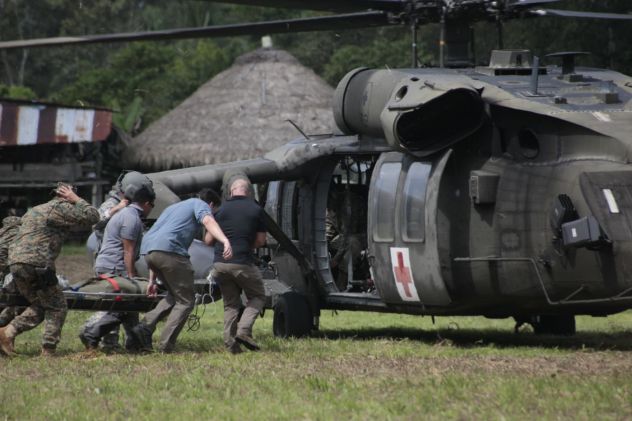Communities of the Panamanian province of Darién, on the Colombian border, benefited from a development assistance campaign January 25-27, 2018. The Panamanian National Border Service (SENAFRONT, in Spanish) held the humanitarian aid operation, Operation Falcon (Operación Halcón), in coordination with the U.S. Embassy and Panamanian healthcare entities.
More than 450 people from the indigenous communities of Buenos Aires, Bella Vista, Galilea, Llano Bonito, and Manené—where the campaign was held—received medical care and various supplies. Roughly 30 SENAFRONT troops and a dozen healthcare workers traveled to Darién on a helicopter fleet from Joint Task Force-Bravo’s 1st Battalion, 228th Aviation Regiment, a component of U.S. Southern Command (SOUTHCOM), in Soto Cano, Honduras.
“We look to create a connection with community members and maintain security in the area,” Major Jorge Bosques Cortés, head of the First Fluvial Battalion Sambú of SENAFRONT, told Diálogo. “In addition [we look] to help care institutions arrive and operate safely in remote areas of the Darién province.”
Health care support
Residents of remote towns along the jungle and rivers of Darién navigated for hours in search of medical care. Little by little, canoes arrived in Manené, where villagers formed a line to get care. Adults were tested for blood sugar levels and lipid profiles to ensure early detection of chronic conditions, while children received several vaccines for the prevention of contagious diseases.
“People come to receive care because they are offered lab services, general medical treatment, medical tests and medications for their treatments,” explained Doctor Elizabeth Castro of Darién Regional Health, a division of the Panamanian Ministry of Health. “The [Ministry of Health] schedules visits every six months because it’s very difficult for them to reach health facilities in other places.”
The medical personnel—general practitioners, pharmacists, several technicians, a dentist, and a nurse—conducted 296 general medical consultations, 77 dental procedures, 151 lab tests, and gave 190 injections. They also dealt with urgent cases, such as a resident of the community of Galilea whose condition deteriorated.
The doctors determined that the 48-year-old patient had malaria. In that moment, the Falcon team demonstrated its effectiveness and ability to respond quickly: after administering intravenous fluids, the patient was placed on a stretcher and evacuated by helicopter to a hospital where he could receive proper treatment.
Joy and gratitude
In addition to medical care, villagers received basic supplies like medications, bags of food, and clothes. “The town needs these tours because there are many illnesses,” Francisco Guaynora, leader of the town of Manené, told Diálogo. “The community is satisfied with the medications, the bags of food, and other things.”
More than social assistance, the campaign brought cheer with songs, dances, and other entertainment for adults and children, who were surprised with piñatas and toys. The clown Pompín, a SENAFRONT member, also paid a visit and exchanged tears for smiles, dispensing candies to children as they received their immunizations.
“These experiences and the work of Operation Falcon for civilian affairs are a binational effort that goes beyond the intent of supplying essential medical necessities,” said Commissioner Eric Estrada, new SENAFRONT director, regarding the development assistance campaign supported by SOUTHCOM. “The integration of these efforts puts into action a strategy that aims to diminish the influence of narcotraffickers and other illegal groups in border towns.”
Danger zone
Falcon concentrated its efforts in the Darién area, also known as the Darién Gap, a dense, humid, 575,000-hectare jungle that Panama and Colombia share. The area is located at the eastern edge of the Panamanian province of Darién and the northern part of the Colombian department of Chocó.
The indigenous towns situated in that remote area, which only connect to the rest of the world by way of large rivers and a few narrow paths, suffer from food and health care scarcity. According to figures from the Panamanian Labor Foundation, a center specializing in the study of social inequality, 87 percent of indigenous families live in extreme poverty, with annual incomes that barely reach $639. The remote region also serves as a transit point for drugs and undocumented migrants headed to the United States.
Likewise, the Revolutionary Armed Forces of Colombia (FARC, in Spanish) made incursions into the area before Colombia and the guerrilla group signed a peace agreement at the end of 2016. “We’ve seen many changes because, before, the people from the mountain [the FARC] would come here, but they don’t walk around here in the community anymore,” Guayanora said.
“The constant support of SOUTHCOM personnel has allowed for all kinds of Panamanian government efforts and resources to be focused on consolidating territorial control and legitimacy of the state in the most remote regions. It also allowed for strategic protection to be brought to the people of Darién,” Commissioner Estrada concluded. “This action dovetails perfectly with SENAFRONT’s field plan and fulfills its end goal of creating the necessary conditions to maintain a climate of peace and prosperity in border areas.”
